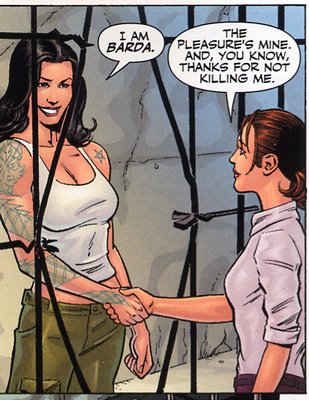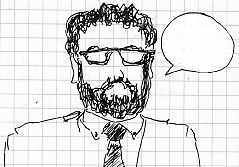Monday, November 20, 2006
A Moment of Clarity
I read Gregory Cwiklik's "What's Wrong With Comics Today: A Completely Personal Overview," from The Comics Journal Winter Special Edition (2002) earlier in the fall, and it had a rather sobering effect upon me.
Who am I kidding? When I read these lines I felt as if I had been slapped in the face:
I came away from the article with many questions:
Is there any hope for mainstream superhero comics?
Can they be read against the grain?
Might they be enjoyed by a non-moron in anything like a sophisticated manner?
I've been stuck on these thoughts for the past several months, kind of going back and forth between answering yes to all three, and then no.
However, this morning this thoughtful LJ post pointed me to the memoir that's up at Occasional Superheroine ("Goodbye to Comics," in several parts) and I've got to say that the tide has pretty much shifted to the no camp.
The writer describes her experiences as an assistant editor at DC during the planning and implementation of Identity Crisis, with the rationale behind the specific decision to have a woman character raped (and later) murdered bluntly described.
If Cwiklik's article was a slap in the face, this woman's memoir is a solid shot to the midsection.
In response, Johanna Draper Carlson echoes Cwiklik's formulation about creators in the industry over at her blog Comics Worth Reading:
Can I continue to buy and read the artistic products generated by this industry?
Who am I kidding? When I read these lines I felt as if I had been slapped in the face:
To sum up bluntly, what's wrong with mainstream comics is that — with few exceptions — they too-perfectly reflect the limited worldview of a juvenile audience whose tastes and sensibilities have been shaped and circumscribed by a moronic popular culture. That many of these juveniles are in their 20s or older is no matter. They are the core constituency; the only group that can be counted upon to buy comic books on a regular basis. One can't help but conclude that the worldview and aesthetic concerns of mainstream comic-book creators are likewise limited. If mainstream creators stay in the superhero/fantasy box, it's because they like it there. They are usually fans of genre material; receiving pay to work in the field is a dream come true. With few exceptions, individuals with a more sophisticated view modify their work to fit within genre parameters. (p. 43)While I won't go so far as to agree with his statement that our popular culture is moronic, I couldn't dispute anything else that he said.
I came away from the article with many questions:
Is there any hope for mainstream superhero comics?
Can they be read against the grain?
Might they be enjoyed by a non-moron in anything like a sophisticated manner?
I've been stuck on these thoughts for the past several months, kind of going back and forth between answering yes to all three, and then no.
However, this morning this thoughtful LJ post pointed me to the memoir that's up at Occasional Superheroine ("Goodbye to Comics," in several parts) and I've got to say that the tide has pretty much shifted to the no camp.
The writer describes her experiences as an assistant editor at DC during the planning and implementation of Identity Crisis, with the rationale behind the specific decision to have a woman character raped (and later) murdered bluntly described.
If Cwiklik's article was a slap in the face, this woman's memoir is a solid shot to the midsection.
In response, Johanna Draper Carlson echoes Cwiklik's formulation about creators in the industry over at her blog Comics Worth Reading:
You put a bunch of immature men, many of whom were very sick as children or had absent fathers or both, and all of whom escaped into over-muscled power fantasies as a result, in charge of a publishing subgroup with no prestige and little money. Several of them have never worked anywhere else, or if they have, it was at one of the few similar companies in the same industry that behave the same way. They’re still geeks, mentally, with low self-esteem and no success with women, few of whom they actually know in person, but they’re power brokers within their little world, and there are thousands like them who desperately want to be them… and you wonder why it all ends up so twisted?As I head off to class this morning, this all precipitates my doubts into a final question:
Can I continue to buy and read the artistic products generated by this industry?
Thursday, November 16, 2006
Breaking Through
Two panels from Birds of Prey #100 made their way through the miasma of grading, event planning, student conferences, and committee meetings that presently has a grip on my brain.
Man, I enjoyed seeing these two panels to such an extent that they pretty much washed away the bad taste left in my mouth from reading Supergirl #11.
First, there's Big Barda introducing herself to Kate Spencer:

And, most pleasurable of all, this month's Birds of Prey provides a modern updating of an iconic WWII-era image:

Man, I enjoyed seeing these two panels to such an extent that they pretty much washed away the bad taste left in my mouth from reading Supergirl #11.
First, there's Big Barda introducing herself to Kate Spencer:

And, most pleasurable of all, this month's Birds of Prey provides a modern updating of an iconic WWII-era image:

